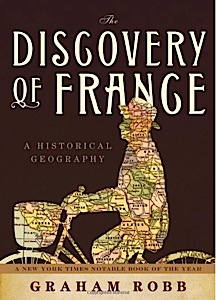An unusual take on French history
 Brits are attracted to living in France, says Marie-Martine Aguer, who has been studying their motivations, in part by what they think of as a traditional rural landscape and way of life which has largely disappeared from the UK. But this countryside they see as part of “an eternal France” is, we are assured by Graham Robb in The Discovery of France (UK: Picador), in many respects “younger than the Eiffel Tower”. In his absorbing book Robb explores two main themes in an unusual take on French history. He explains how the France we know today only came into being when the parents of Marie-Simone Capony, who died in Cannes recently aged 113, were still alive; and then he describes what an earlier quite different France was like and how it came to be transformed.
Brits are attracted to living in France, says Marie-Martine Aguer, who has been studying their motivations, in part by what they think of as a traditional rural landscape and way of life which has largely disappeared from the UK. But this countryside they see as part of “an eternal France” is, we are assured by Graham Robb in The Discovery of France (UK: Picador), in many respects “younger than the Eiffel Tower”. In his absorbing book Robb explores two main themes in an unusual take on French history. He explains how the France we know today only came into being when the parents of Marie-Simone Capony, who died in Cannes recently aged 113, were still alive; and then he describes what an earlier quite different France was like and how it came to be transformed.“The true taste of France was stale bread”
As the book spells out in great detail, across the nineteenth century this France of highly localised communal cultures was undermined and transformed by a whole set of new influences: the coming of the railway along with improvements in canals and roads and, in Mme Capony's early years, the bicycle boom which allowed villagers to be much more easily mobile. Other influences were compulsory military service and the introduction of primary education. At the same time an increasingly centralised French state worked actively to weaken local attachments, notably by the suppression of regional languages, from Flemish in the north to Nissart in the south. The aim was to replace old communal loyalties with an equally strong (and exclusive) emotional tie to la patrie.
This is a rich book, with incidental coverage of such varied topics as the effects of standardised time and the emergence of public lavatories (with pioneer provision in Nice, Antibes and Saint-Raphaël). In conclusion, Robb notes how the strengthening of national over communal loyalties saw the old étranger, danger reaction projected outward against all those who weren't native French and this remains a live element in popular feeling. The sentiment behind the neo-fascist poster recently displayed in Nice - “Socca oui, Kebab non” - was a depressing illustration of this.
Reporter 127 - June/July 2008






